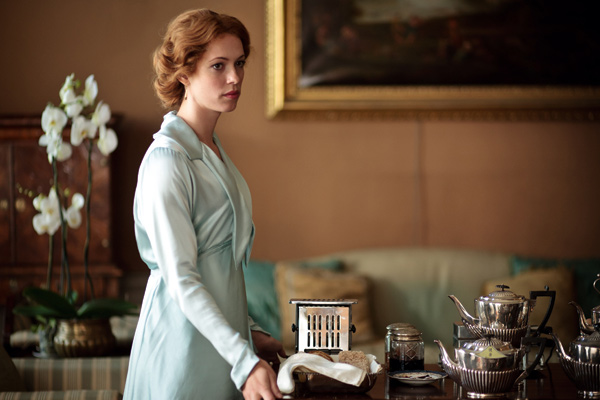Every so often a programme appears which can be recommended even to people who hate television. Parade’s End (Friday, BBC1) is such a work. The awkward — one might think impossible — problem of shortening Ford Madox Ford’s 800-page masterpiece into five hours of television, without violating the spirit of the book or seeming to cram a quart into a pint pot, has been solved by getting Tom Stoppard to write the script.
Stoppard’s less is not exactly more, but there is a certain liberation in being able to leave things out. Ford’s wit, penetration and eloquence are distilled into the five acts of a play, and some of his best lines echo all the clearer for being spoken in relative isolation. The drama’s hero, Christopher Tietjens, is a kind of English Hamlet: a man of brilliant intelligence, capable of decisive action, but too scrupulous to move with lethal force against the member of his family who has betrayed him. For Hamlet, the enemy is his uncle, Claudius: for Tietjens, it is his wife, Sylvia.
The logical, self-interested thing for Tietjens to do would be to divorce the ‘papist bitch’ (as another character calls her) who trapped him into marriage and has now cuckolded him. But this is England in 1912 and although Tietjens knows that ‘the end of the world is upon us’, he is committed to a code of conduct that renders him unable to save himself. As he himself puts it, ‘For a gentleman, there is such a thing as, call it “parade”. I stand for monogamy and chastity and for not talking about it.’
Do not be put off by the severity of the code. The surface glitters with jokes. Above all, the first episode glitters with Rebecca Hall, who plays Sylvia. In photographs advertising this production, she looks rather forbidding. But in motion she becomes wonderfully animated, playful, seductive and needy. No one else could say the words ‘I’m bored’ in such a fascinating way. When her lover locks the door of their room and threatens to shoot her because she is going to leave him, she sits with her back to him at a writing table and remarks with composure, ‘These hotels one’s been staying in, the notepaper is simply shaming.’
Benedict Cumberbatch, as Tietjens, is very good at conveying suppressed emotion. He weeps without weeping. He also surprises us by rescuing two suffragettes, of whom he might be expected to disapprove, when they attack a politician on a golf course. With one of these suffragettes, Valentine Wannop, played by Adelaide Clemens, he is soon bowling along in a dog-cart, lost in thick fog but conversing with such perfect ease that it is evident she is the woman he ought to have married. A car driven by a general in a scarlet uniform crashes into them. A world war in which Tietjens will serve in the trenches is about to crash into them, too.
The production looks gorgeous: the settings and the costumes of the 35 actors in the cast list printed in the Radio Times are more immaculate than they would have been in 1912. Suffering in a less dressy idiom could be found in Our War (Monday, BBC3), a documentary that followed the fortunes of the men of Arnhem Company, the Duke of Lancaster’s Regiment, on a three-day operation in Afghanistan.
The fighting proved more ‘kinetic’ — ominous euphemism — than had been expected. The operation ended with Arnhem Company exhausted, dehydrated and carrying their mortally wounded commander, Captain Andrew Griffiths, on to a helicopter. His last quoted words were ‘thank you’. His bereaved father, Brigadier Mike Griffiths, said with tears running down his cheeks, ‘To not believe it was in a good cause would be to say to all those who’ve given their lives, to all those who’ve been wounded…that it was not the right thing to do.’
An alternative to this heart-rending heroism was the heart-rending horror of the Moors murders: a story retold in Ian Brady: Endgames of a Psychopath (Monday, Channel 4). The programme described how Brady, sentenced to life imprisonment in 1966, had manipulated all those around him. It was filled with gloomy, portentous music and morbid ruminations about Brady: ‘It is difficult to see this as anything other than yet another of his cruel games.’
Amid the overfamiliar archive photographs, and a cameo appearance by the late Lord Longford playing himself, the one new scrap of information concerned a sealed letter Brady had given to Jackie Powell, his mental health advocate. This letter may conceivably indicate where Brady buried one of his victims, Keith Bennett, whose inconsolable mother has just died. Powell has now left home amid fears that she might be attacked by vigilantes. Can it be that by wallowing in this horror, we too are colluding in Brady’s cruel games?






Comments